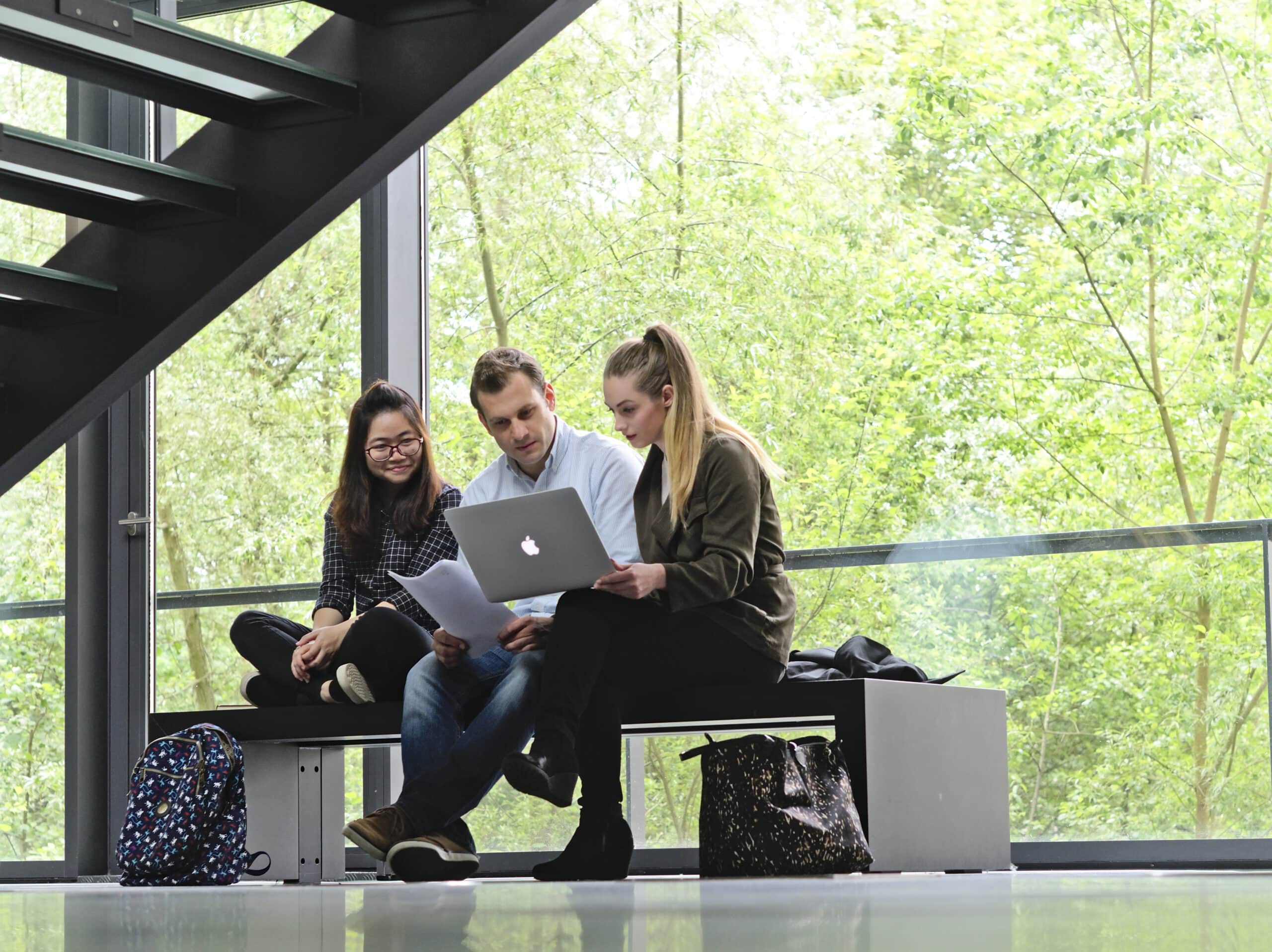“You are here to learn, and you are still allowed to make mistakes. If you didn’t make mistakes and knew everything, you wouldn’t have to study at all.”
Sandrine Zeiter still remembers the day her thesis supervisor, Professor Dr. Elena Mugellini uttered these words to her. As a master’s student at the University of Fribourg, she had been struggling with her final thesis — made all the more challenging when some personal difficulties came into play. Her two supervisors, Dr. Mugellini and Professor Dr. Rolf Ingold were quick to offer their support and remind her that she was at university not to come up with all the answers — but to develop as an academic.
Such levels of support and encouragement are considered the norm at the University of Fribourg. With approximately 10,000 students across the bachelor’s, master’s and PhD programmes, every learner has access to first-class personal support from a variety of skilled and experienced faculty. They live and learn together in a sleek yet quaint campus environment in the heart of Switzerland — the perfect study environment to generate focus and inspiration.
As a Master in Computer Science student, Zeiter was determined to take advantage of this. Her thesis was grounded in the development of “an eXplainable Artificial Intelligence (XAI) chatbot and its impact on user perceptions and behaviour.” It was a challenging topic — but one that she undertook with the support from the Fribourg community.

The university has a strong research orientation, investing significantly in research activities. In recent years, Fribourg has consistently ranked among the top Swiss universities for research output. In 2019, the university had 488 publications, showcasing its commitment to academic exploration and advancement. Source: University of Fribourg
One such way was by collaborating with her two supervisors and a PhD student. “Whenever we met, they gave feedback about the current state of the project,” she explains. “The PhD student helped me a lot with the practical part, pointing me to some ideas and keywords to get started. They were very understanding as well — for example, my supervisors would tell me to cut down on my workload before an upcoming presentation if it was too heavy. I felt supported and encouraged that we could adjust the goals whenever we realised they were not possible.”
On top of this, she was able to tap into the wider Fribourg student community for help. For example, she had a friend who acted as her coach. “We met weekly so that I could tell him what I did,” she explains. “This led to more commitment, and I was forced to work on the thesis and write down what I did. I also talked a lot with different people when I had difficulties, and everyone had some ideas or hints that helped during my work. It felt amazing whenever I could fix a problem thanks to discussions or research.”
Computer science graduate Jonas Giulio Pierre Fontana had a similar experience. “During my time at Fribourg, I worked closely with lecturer and senior researcher Giuseppe Cuccu,” he shares.

Fribourg’s student community is notably diverse, with over 10,000 students from more than 110 countries. This global representation enhances the international atmosphere, allowing for cross-cultural interactions and a broader worldview. Source: University of Fribourg
“He first was my teacher for the ML course, then I worked as his sous-assistant (for the same lecture), and then I wrote my master thesis with him. In all the roles he always invested a lot of time for my personal growth, much more than he’s professionally required. He taught me so much, showed me my strengths and weaknesses, and always believed in me much more than I did.”
Originally from Lugano — a largely Italian-speaking region — Fontana was drawn to Fribourg’s multilingual approach. Here, students learn in two languages during their Bachelor: French and German. “I’ve always considered learning new languages very important, probably due to the fact that my native language (Italian) is not really enough to live in Switzerland unless you remain in Ticino,” he explains.
It’s a winning factor that attracts students from far and wide, representing over 110 countries. Indeed, Fribourg is ranked one of the best 100 universities in the world for international outlook. Despite this, the university maintains a small, close-knit environment — making for a more personalised learning experience. “My classes were very small and interactive,” says Fontana.

The University of Fribourg was founded in 1889 through the merger of a Jesuit college founded in 1580 and an academy founded in 1763. This merger has established a unique blend of traditional academic values and modern educational approaches. Source: University of Fribourg
The university provides an array of specialised classes — some of Fontana’s favourites were Automata on Infinite Structures and Verification of Cyber-physical Systems, Design and Graphics Programming for Game Development and Machine Learning. “The course was quite intense, but later in my studies I noticed how it gave me very solid bases,” he says of the latter. “In addition, the course provided a ton of extra material and links, allowing me to deepen the topics I preferred.”
Such experiences help students like Fontana and Zeiter push the boundaries of their knowledge — and, ultimately, discover their areas of specialisation. They and other students are now practising their craft through the skills they’ve learnt.
From computer science to life science, and all the way to geography, students of the Faculty of Science and Medicine of the University of Fribourg enjoy excellent training, opening doors for successful careers in research and innovation.
Follow the University of Fribourg on Facebook, Twitter, YouTube, LinkedIn, and Instagram










